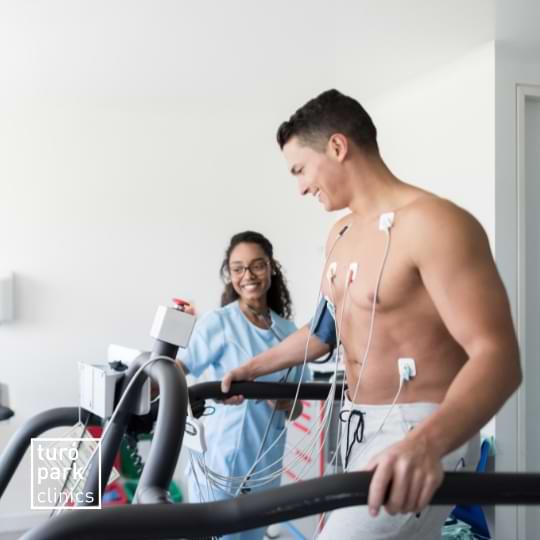Would you like to have an exercise test in Barcelona?
The exercise electrocardiogram, more commonly known as the "stress test", measures the reaction of the heart during sustained physical activity. It is particularly indicated after the age of 50, if you wish to resume sporting activity or if you have cardiac risk factors.
If you would like to have an exercise test, our medical clinic is fully equipped to carry out this type of test and our cardiologists will take the time to explain the results of your electrocardiogram to you, as well as the measures to be taken in the event of an anomaly.
Make an appointment now!
Fast-track your treatment!
To make an appointment or speak with one of our team members, please contact us using the options below.

Why perform a stress test?
Generally recommended by a general practitioner or a cardiologist, the stress test can detect a certain number of cardiac pathologies.
It is particularly useful for :
- Determining the cause of chest pain,
- Monitor the proper functioning of the heart, especially after a myocardial infarction,
- Monitoring the evolution of a heart disease,
- To determine the training modalities for high level sportsmen,
- Monitor the subject who has cardiovascular risk factors or the sportsman over 55 years old.
How does a stress electrocardiogram work?

Step 1: The preliminary interview
The interview with the cardiologist focuses on family history and cardiovascular risks related to smoking, diabetes, cholesterol, hypertension and even obesity.

Step 2: Clinical examination
Before the test, a clinical examination is carried out: listening to the heart, auscultation of the lungs, heart rate and blood pressure.

Step 3: The test
The exercise test generally lasts twenty minutes. It is performed in a cool room (18 to 20°C). It takes place in progressive stages: the resistance of the treadmill is increased every 3 minutes on average.
The test is interrupted in the event of exhaustion or severe shortness of breath, reaching the theoretical maximum heart rate, too high blood pressure, heart rhythm disorder or malaise.
How do you prepare for a stress test?
Before the test, an appointment with your general practitioner or cardiologist will be made. The main purpose of this appointment is to ensure that there are no contraindications and that it is safe to undergo the stress test.
No prior preparation is necessary. However, in view of the upcoming effort, it is important to have eaten a normal meal (two to three hours before the start of the test). So avoid fasting or eating a rich snack just before the test. You should also wear comfortable clothing, preferably sportswear.
A healthy heart is a happy heart.
Our English-speaking cardiologists are available for the diagnosis and treatment of all your cardiovascular problems.

Our multilingual cardiologists

